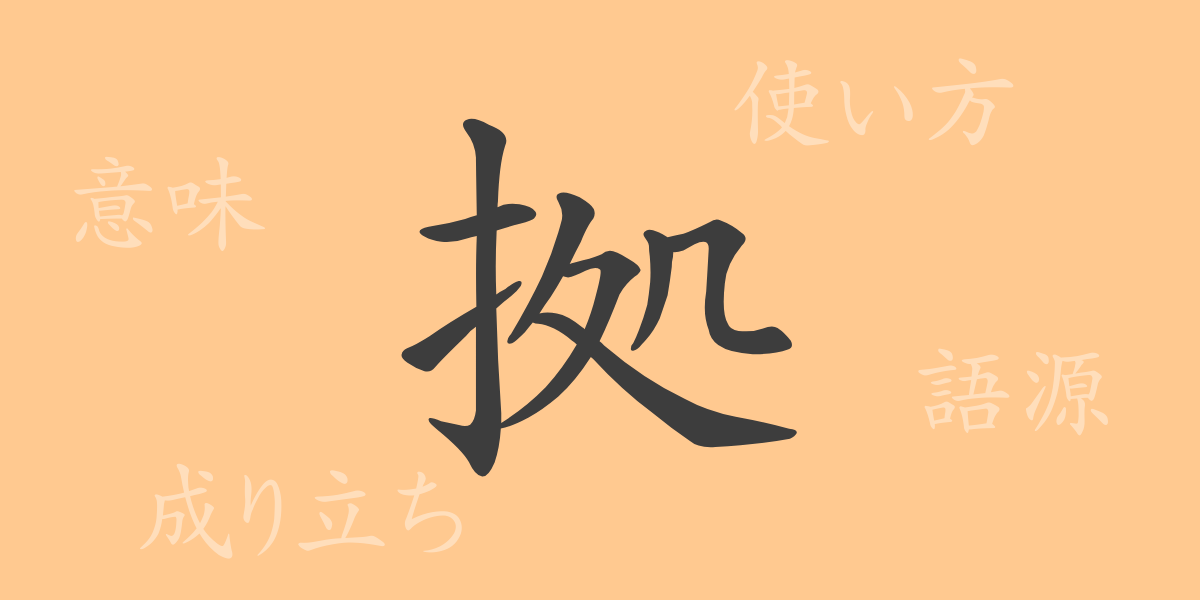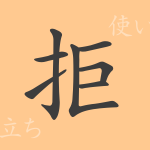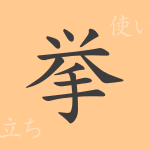Each character in the Japanese language carries its own unique history and meaning, reflecting the rich cultural background of Japan. The common kanji character “拠(きょ, kyo)” is no exception. Despite its frequent use by many Japanese people in daily life, opportunities to learn about its origins and diverse usages are surprisingly rare. Let’s explore the world of kanji through the character “拠(きょ, kyo)” and rediscover the richness of the Japanese language.
Origin of 拠(きょ, kyo)
The kanji “拠(きょ, kyo)” was transmitted from ancient China and its form depicts a hand supporting something. Originally, the character “据(すえ, sue)” existed, which is the prototype of “拠(きょ, kyo).” “据(すえ, sue)” is a pictograph illustrating a hand firmly pressing down on a tool, from which “拠(きょ, kyo)” derived, meaning to secure a position.
Meaning and Usage of 拠(きょ, kyo)
The kanji “拠(きょ, kyo)” means “to rely on,” “to lean on,” and signifies situations such as basing something on, depending on, or using something as a foundation. It is commonly used in the word “根拠(こんきょ, konkyo),” meaning “basis” or “foundation.” For example, it can be used in a sentence like, “This paper is based on solid evidence” (この論文は確かな根拠に基づいている, kono ronbun wa tashikana konkyo ni motozuite iru).
Readings, Stroke Count, and Radical of 拠(きょ, kyo)
Let’s look at how the kanji “拠(きょ, kyo)” is read and its characteristics in Japanese.
- Readings: The on-yomi (Chinese reading) is “キョ(きょ, kyo),” and the kun-yomi (Japanese reading) is “よ.る(よる, yoru)” and “す.わる(すわる, suwaru).”
- Stroke count: “拠(きょ, kyo)” has a total of 11 strokes.
- Radical: The radical is “手(て, te),” meaning “hand.”
Idioms, Proverbs, and Phrases Using 拠(きょ, kyo)
Idioms, proverbs, and phrases incorporating “拠(きょ, kyo)” play a significant role in the Japanese language. Here are a few examples:
- 拠点(きょてん, kyoten): Refers to a central location or position for a specific activity.
- 根拠(こんきょ, konkyo): The facts or reasons that support something.
- 拠出(きょしゅつ, kyoshutsu): To provide money or supplies.
- 拠り所(よりどころ, yoridokoro): A source of support or something/someone reliable.
Summary of 拠(きょ, kyo)
The kanji “拠(きょ, kyo)” holds meanings related to securing a position or providing a foundation and is used in many idioms and phrases. This character’s rich meanings reflect the depth of Japanese language, and its use in daily life allows us to feel the historical and cultural background it embodies.

























